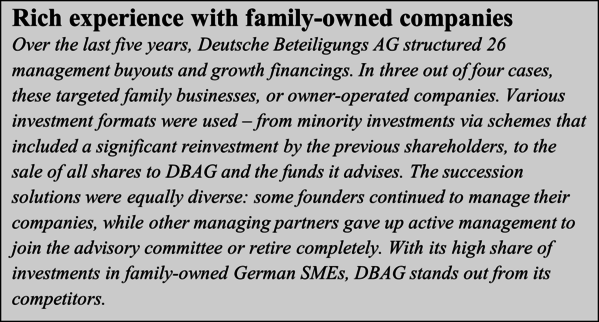Benefiting from DBAG’s network and know-how
Shortages of craftsmen and airport staff, tedious searches for skilled workers and trainees – demographic change is becoming increasingly visible. While the COVID-19 pandemic and the war in Ukraine have pushed the issue into the background, it’s still there. The German economy needs to prepare for labour shortages and unfilled vacancies across all levels, right up to and including company owners and founders.
High demand for successors
According to Germany’s public sector development bank KfW (Kreditanstalt für Wiederaufbau), around 230,000 out of the 3.8 million German SMEs will be seeking a succession solution by the end of 2022. By the end of 2025, this number will have risen to 600,000. A recent survey by IfM Bonn (Institut für Mittelstandsforschung Bonn), a think-tank specialising on the SME sector, revealed that 190,000 owner-operated companies in Germany will likely change hands over the next five years. The majority of these companies generate annual sales in the range between 500,000 and 2 million euros and are thus off the radar for private equity investments. In the category of larger companies (with annual sales of more than 10 million euros), however, there are still more than 7,000 companies seeking a succession solution. For major private equity investors such as DBAG, this offers many additional opportunities for investments in owner-operated SMEs in the years to come.
Reservations about private equity
Countering the reservations about private equity partnerships that continue to exist among German SMEs is a real issue. Only one out of eight SME owners would consider selling their company to a private equity investor, according to a recent survey by the Bundesverband Mergers & Acquisitions (the German Federal Association of Mergers & Acquisitions professionals), which will shortly be published in full. The entrepreneurs surveyed indicated that they would only sell to private equity investors if said investors offered the highest price possible, whereas 43 per cent of company owners are willing to sell their company to a competitor. “This perspective tends to forget that selling to a competitor often results in the loss of the company’s independence, and job cuts,” Torsten Grede, Spokesman of DBAG's Board of Management emphasises. But this is, in fact, exactly what entrepreneurs dread about a sale to a private equity investor, as the first study results reveal: 86 per cent want to save jobs and more than 50 per cent want to ensure their company's survival.
Yet there are many examples of transactions with family-owned and owner-operated businesses demonstrating that partnerships between private equity and SMEs actually create jobs, since – unlike competitors – financial investors are not obsessed about synergies when entering a minority or majority investment in a company. Private equity initiates change processes to accelerate growth and strengthen the competitive position. Thus, in many cases, the original company’s existence can be maintained.
Dynamic sales development and job engine
One example is Cleanpart Group. The service provider offers maintenance of process-critical machine components for the semiconductor industry, especially when it comes to the production of logic chips, memory chips and similar components. Deutsche Beteiligungs AG invested in Cleanpart Group in April 2015 alongside DBAG Fund VI. The transaction was part of the succession planning for the company, which until then was run by the founding family. The succession planning involved strengthening the management team: the owner became chairman of the advisory committee, while second-level managers were appointed CEO and CFO. In addition, regional level executives were given higher incentives to promote entrepreneurial behaviour and thus accelerate global growth. All that contributed significantly to dynamic sales development and – as a consequence – higher earnings.

At Cleanpart, process-critical components are maintained in machines for the semiconductor industry. The former DBAG investment – here an image of the testing and packaging of such components under cleanroom conditions from 2015 – has grown strongly and successfully under the aegis of DBAG Fund VI.
At the same time, new staff were hired, especially in sales and human resources. To support the healthcare business, investments were made in additional production sites and in a new plant at an existing site, while the service portfolio was expanded. Until the sale of the company in 2018, sales had grown by 9 per cent per annum; the number of staff had increased from 327 to 420. DBAG’s investors and shareholders also benefited from this favourable development: the amount returned equalled 2.4 times the original private equity investment – a return of more than 30 per cent.

PE as a catalyst for sustainable growth
The fact that public perception and the entrepreneurs’ actual experience may differ is once again demonstrated by a recent survey conducted by market research provider nhi²: 64 per cent of the PE-experienced participants assessed the investors’ impact on their company as being positive overall – in terms of sales, earnings, investments, and number of staff. This stands in contrast to that almost 88 per cent of entrepreneurs surveyed by IfM that would not consider a sale to PE – which might be explained by their lack of actual experience with PE.
Examples from DBAG’s portfolio demonstrate that cooperating with a private equity investor in fact leads to sustainable growth: former portfolio company inexio, based in Saarlouis, developed rapidly following DBAG’s investment. The company’s management is able to respond quickly, at an early stage, to additional requirements for high-performance data traffic infrastructure. Solid capitalisation allowed inexio to acquire additional local broadband providers in the years following the investment. The result: the number of customers quintupled as compared to the beginning of the investment, sales and operating profit increased by more than 20 per cent per annum, and the number of staff more than tripled, rising to 400.
Thanks to its partnership with DBAG, Formel D has seen sales and profitability grow by more than 20 per cent since the start of the investment. At the beginning of the cooperation, the company offered various service solutions for the automotive industry, ranging from vehicle development and production to after-sales activities. When the company was sold again, it counted around 7,150 staff worldwide – almost three times more than at the beginning of the investment – and ran more than 80 sites in 22 countries. Key for this development were strategic and operational measures to open up market potential.

Currently, 10,500 people in 22 countries with 90 subsidiaries work for Formel D, a leading service provider for the automotive industry and its suppliers. Among other things, this involves quality assurance – here an image from 2015 – and process optimization. With the participation of DBAG, the succession in the family business was regulated.
“Break-ups rarely generate value”
According to the IfM survey, company owners fear that if they sell their company to an investor the company’s identity and the brand they had built for years could be lost. Here again, current examples from DBAG’s portfolio show that rather the opposite is true: since its acquisition by DBAG Fund VII, Cloudflight – a leading full-service provider for industrial digital transformation – has grown from 350 to more than 950 employees in less than three years. Decisive factors were organic growth and mergers with other companies to broaden the product range.in-tech, a consulting and engineering company based in Garching near Munich, is poised for growth, too. This investment was structured by DBAG at the beginning of the year. Only few months later it made its first acquisition, buying the data communications company Ruetz Solutions, marking a first step on the growth path going forward. “Break-ups rarely generate value,” Mr. Grede explains. The spokesman of DBAG’s Board of Management has been structuring company investments for more than 30 years. “In most cases, private equity promotes investment and provides impulses for further development and growth in companies. Especially when it comes to capital-intensive growth strategies, private equity is a good alternative.”


 Newsletter
Newsletter
 Contact
Contact
 Downloads
Downloads






